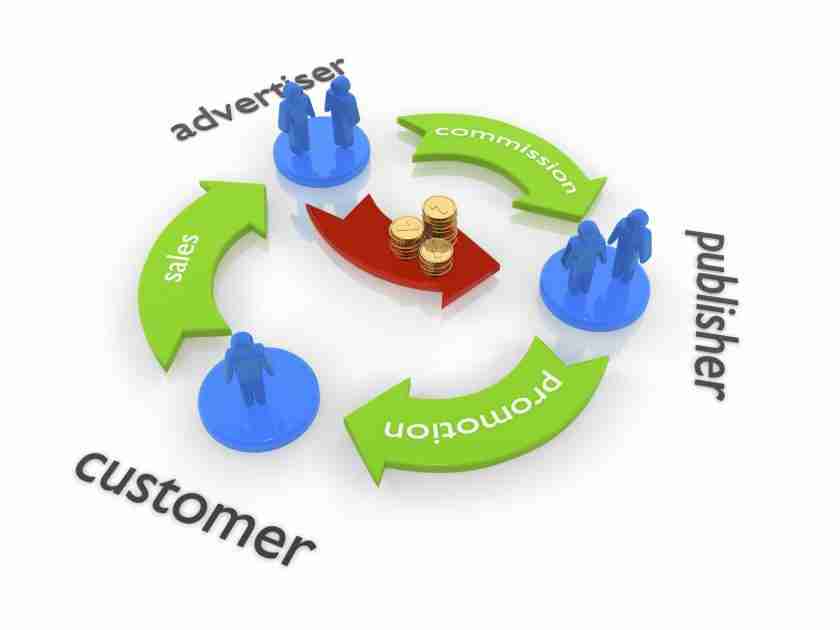What is Affiliate Marketing?
Affiliate marketing is a type of marketing in which a business rewards an affiliate for each visitor or customer brought by the affiliate’s own marketing efforts. The idea behind it is that you promote other people’s products, often through an affiliate network, earning a commission if people actually end up buying thanks to your marketing. An affiliate can use different internet marketing techniques like organic search engine optimization, paid search engine marketing (PPC – Pay Per Click), e-mail marketing, content marketing and display advertising to divert the traffic to merchants website.

Affiliate Marketing is based on revenue sharing model. If you have a product and want to sell more, you can offer promoters rewards through an affiliate program. It is one of the oldest ways of marketing. You can promote a product that you feel has value and earn an income from it as an affiliate marketer.
Basics of Affiliate Marketing
Affiliate Marketing is the relationship between three parties.
- Advertiser
- Publisher
- Consumer

Advertiser:
In affiliate marketing, an advertiser can be a company selling a product like electronics, airline tickets, clothing or car parts, or an advertiser could also be an insurance company selling policies. The most important thing to remember is that you are an advertiser if you are ready to pay other people to help you sell and promote your business. You have to share some revenue with your affiliate marketer.
Publisher:
A publisher is an individual that promotes the product or service provided by the advertiser in exchange for earning a commission. The publisher is the affiliate marketer. Advertisers contractually agree to work with a publisher, then provide the publisher with creative in the form of links, banner or text ads that the publisher incorporates into their website.
Consumer:
A consumer is a final link which completed the cycle of Affiliated marketing. The consumer is the one who actually sees the ad and then goes to the advertiser’s website by clicking a link. The links take them from the advertiser’s website to complete the transaction. If a consumer ends up buying the product we call it a conversion. This is how a complete cycle of affiliate marketing works.
Affiliate Marketing Need no Investment:
Most affiliate programs are free to join. You can work from anywhere anytime as long as you have an active internet connection. So your costs are usually related to your referral and marketing methods. You don’t have to create a product or service. Also, you need not worry about shipping and stocking of products. The affiliate marketing is ideal for bloggers, information entrepreneurs, and anyone who has a website.
If you have a good knowledge of content marketing the affiliate marketing can be the best option for your side earnings. You are not answerable to anybody your income depends on how you market your affiliates programs.
Who can Become Affiliate Marketer:
Affiliates can be individual bloggers, publishers, and influencers as well as companies. Here are some of the examples:
- Content/Blogging Sites
- Coupon Sites like Grabon and couponduniya
- Deal Sites like MakeMyTrip and cleartrip
- Loyalty/reward sites
- Influencers

How to Become a Successful Affiliate Marketer?
Becoming an Affiliate marketing is not hard, but it does require knowledge, planning, and consistent effort to make any significant income from affiliate marketing. Below are some tips and tricks to become a successful affiliate marketer
#1 Choose your Products Wisely
Choose only quality affiliate products and services. In fact, consider buying them yourself so you can attest to their quality. You’ll be judged by the product or services you promote, so don’t just focus on the income, but also on the quality. Also, Choose affiliate items that match your niche or the content on your home business website or blog. For example, if you write about how to create a website then your product should be something like Web host servers or website themes. You can,t sell clothes on a blog of how to create a website.
#2 Try to help rather than sell:
Your first effort should be why should your reader by this product. Talk more like an unbiased reviewer rather than a high-pressure salesperson, we will find we make more sales and people will come back for advice on other products in the future. People want to hear from other people when making a decision to buy a product or not. So, if you don’t help the reader learn why they should have the product and only wanted them to click a link the chances of conversions are very low.
#3 Choose your Affiliate Program Wisely
Another big mistake newbie affiliate marketer make is joining any and every affiliate program. You don’t want to become thing unmanageable. So, Choose your affiliate programs wisely and don’t overload yourself.
#4 Create an Email List:
Start an email list. The most successful affiliate marketers use email in their affiliate marketing. Don’t put this off. Email marketing can increase your affiliate profits significantly. Use a lead page and funnel system to market your affiliate business. Lure your visitors to subscribe with a great free offer, and from there you can send them to your affiliate product page. In your email system, you can offer more great free content and more affiliate offers.

#5 Monitor your Success:
Monitor the success of your affiliate programs. Consider adding two or three different categories of products. Analyze your data through Adsense. Sometimes having too many ads dilutes the site or distracts readers, resulting in lower performance. Once you are aware of the mistakes that can cause a lack of profits and productivity, you will be better able to grow your business and be profitable long-term.
#6 Concentrate on One Thing at a time:
Affiliate marketing is a business that requires self-motivation and focus. In Affiliate marketing, it can take time to start earning revenue. In this case, rather than changing your product or affiliate program try to make the existing structure better. One completed and the profitable campaign is worth so much more than 50 almost half-finished campaigns or projects.
These are some tips and tricks using which you can become a successful digital marketer. Now let’s see some Frequently asked questions on Affiliate marketing.
Frequently asked questions on Affiliate marketing.
Ques 1: How do Affiliate Marketers get Paid?
Answer: Affiliates can get compensated in a variety of ways, which are determined by the merchant. The three most common are pay-per-sale, pay-per-lead and pay-per-click. Affiliates only get paid when their promotional efforts actually result in a transaction. Most often, all payments earned by affiliates are paid out through the third-party network the program is hosted on.
Ques 2: What is the Commision Rate?
Answer: Commission rates are based on a percentage of the total sale. In some cases, it can also be a flat fee for a transaction. Your commission rate is set by the merchant.
Ques 3: DO AFFILIATE Marketer need any kind of certificate to become one?
Answer: No, There is no certification required. However, we do recommend that you learn as much as possible about what it means to be an affiliate. Fortunately, there is a lot of information out there to help educate new affiliates, including podcasts, blogs, webinars, research reports and much more.
Ques 4: Can I place your ads alongside ads on Google Adsense or other advertising networks?
Answer: There are no restrictions whatsoever. You can promote affiliate programmes regardless of whether you work with other advertising networks.
Ques 5: How to communicate with Publishers?
Answer: The easiest way to communicate with publishers is to do it via affiliate networks, which send newsletters and campaign bulletins to publishers from time to time. We recommend that you inform the affiliate network about new offers, advertising materials and possible changes in campaigns. Developing advertising campaigns and coming up with ideas for them are among affiliate networks’ duties.
Ques 6: What is a good commission model?
A good commission is competitive compared to other actors in the field and tempting enough for publishers. The good commission also rewards those collaborators, who produce more sales. From an advertisers point of view, the good commission is profitable so paying the bill of transactions from affiliate network should be positive.



![[Case Study] EduKart: Shop The Right Course By Carting It](https://www.whizsky.com/wp-content/uploads/2019/02/EduKart-218x150.png)
![[Case Study] How OnePlus Made It To Top In Indian Market](https://www.whizsky.com/wp-content/uploads/2019/02/oneplus-became-premium-brand-in-India-218x150.jpeg)








